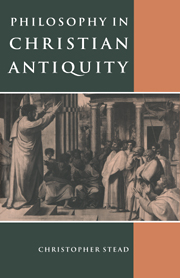Book contents
- Frontmatter
- Contents
- Preface
- List of abbreviations
- PART I THE PHILOSOPHICAL BACKGROUND
- 1 From the beginnings to Socrates
- 2 Socrates and the Platonic Forms
- 3 The philosophy of Plato's maturity
- 4 Aristotle
- 5 Epicurus and the Stoics
- 6 The Middle Platonists and Philo of Alexandria
- 7 The philosophy of late antiquity
- PART II THE USE OF PHILOSOPHY IN CHRISTIAN THEOLOGY
- PART III AUGUSTINE
- Bibliography
- Index of Names
- Index of Subjects
7 - The philosophy of late antiquity
Published online by Cambridge University Press: 29 September 2009
- Frontmatter
- Contents
- Preface
- List of abbreviations
- PART I THE PHILOSOPHICAL BACKGROUND
- 1 From the beginnings to Socrates
- 2 Socrates and the Platonic Forms
- 3 The philosophy of Plato's maturity
- 4 Aristotle
- 5 Epicurus and the Stoics
- 6 The Middle Platonists and Philo of Alexandria
- 7 The philosophy of late antiquity
- PART II THE USE OF PHILOSOPHY IN CHRISTIAN THEOLOGY
- PART III AUGUSTINE
- Bibliography
- Index of Names
- Index of Subjects
Summary
During the first two Christian centuries Platonism gradually became the dominant philosophy. The Epicureans had lost their appeal by the end of this period, which witnessed a revival of religious interests, both good and bad. Second-century Stoicism is represented for us by the freed slave Epictetus and the Emperor Marcus Aurelius, who were widely respected as moral teachers; but its theoretical side is unknown to us, though Cornutus, an associate of Seneca, commented on Aristotle's logic in works now lost. A general acquaintance with both Epicurean and Stoic doctrine of course persisted much longer, as part of a general philosophical education. Meanwhile, many Pythagoreans were closely allied to the Platonists, and only a minority considered themselves a distinct school. The Aristotelian Aspasius (c. 100–150) wrote a range of commentaries on Aristotle, of which that on the Nicomachean Ethics survives in part. More important are the extensive surviving works of Alexander of Aphrodisias, early third century, the last really distinguished member of the school. His De Fato especially, which deals with the problems of determinism and free will, retains an interest for the non-specialist today.
Opposition to the Platonists came chiefly from a revived scepticism, which claimed to be pursuing the tradition of Pyrrho of Elis, c. 365–275 bc, who himself may have been indirectly indebted to Socrates and more closely to Democritus. We have noted that the Academy went through a sceptical phase under Arcesilaus and Carneades (p. 44), which was perpetuated by Cicero.
- Type
- Chapter
- Information
- Philosophy in Christian Antiquity , pp. 63 - 76Publisher: Cambridge University PressPrint publication year: 1994

